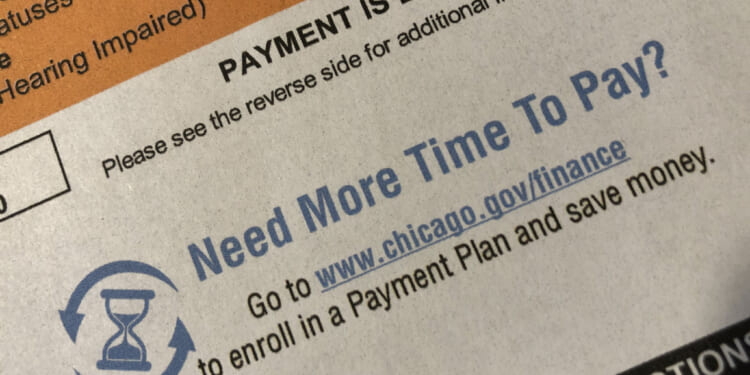Chicago’s 2025 budget needed $345 million in fines, forfeitures and penalties. It was $99 million 30 years ago. What will the new budget extract from residents?
Each Chicagoan is expected to be fined $127 this year to support the city budget, a significant jump from the $35 the city collected in fines, forfeitures and penalties in 1996.
Now the question is: Will Mayor Brandon Johnson expect even more, continuing to grow the city’s reliance on fines as it struggles with a projected $1.15 billion deficit for 2026?
Johnson is expecting to collect $345 million in revenue from punishing people this year. That’s up from $99 million in former Mayor Richard M. Daley’s 1996 budget.
Fines and penalties include red-light and speed camera tickets, parking tickets, moving violations, vehicle booting fees, sanitation violations and housing court fines. The rise per Chicagoan is also a result of the city’s population shrinking.
Even after accounting for three decades of inflation, the burden of fines and penalties per Chicago resident grew by 75%.
Visitors will pay some of these costs, but Chicagoans ultimately pay the price if these revenues come up short. They also pay if tickets drive away tourists.
Chicago wasn’t always so dependent on nickel-and-diming residents to balance budgets. In the late 1990s, fines and penalties made up 4.9% of the city’s corporate fund, the part of the budget used to run the city. It went to 7.8% under Daley, with fines and penalties bringing in over $254 million by former Mayor Richard M. Daley’s final year in office.
Under former Mayor Rahm Emanuel, Chicago’s reliance on fining residents grew even further, peaking during 2014 at 12.8% of the corporate fund. The city that year relied on $414 million from fines, more in dollar terms and as a share of total revenue than in any year during the past three decades.
The city’s annual financial analysis for 2014 attributed these higher revenues in part to the adoption of speed cameras the previous year, as well as increased collection efforts by the city and higher fines for certain street violations and fees for the storage of impounded vehicles.
Despite bringing the share of city revenue derived from fines and penalties down in his remaining years as mayor, corporate fund revenues from Emanuel’s final budget in 2019 ended with 9.2% coming from fines.
Former Mayor Lori Lightfoot further reduced the city’s reliance on fines and penalties, in large part by growing revenues with federal assistance during the COVID-19 pandemic. She brought the corporate fund revenue from fines down to $302 million and the share to 5.8%.
But under Johnson, the amount of revenue coming from fines and penalties has rebounded to $345 million in the most recent city budget. It increased to 6.4% of the corporate fund.
Johnson’s office did not respond to a request for comment, including the role fines and penalties would play in the 2026 budget.
Relying on taxpayers to make hundreds of millions of dollars in mistakes to balance city budgets each year is a fiscally irresponsible tactic for funding Chicago’s operations. It is also a good way to drive visitors and residents out of the city.
Rather than continuing the Chicago tradition of raising revenue with regressive punishments, the city should control its spending and pursue other long-term financial solutions. Those include cutting permanent costs that used temporary pandemic funds, linking spending to economic growth and promoting an amendment to the Illinois Constitution allowing for containment of government pension growth.










